Environmental Management
Environmental Governance
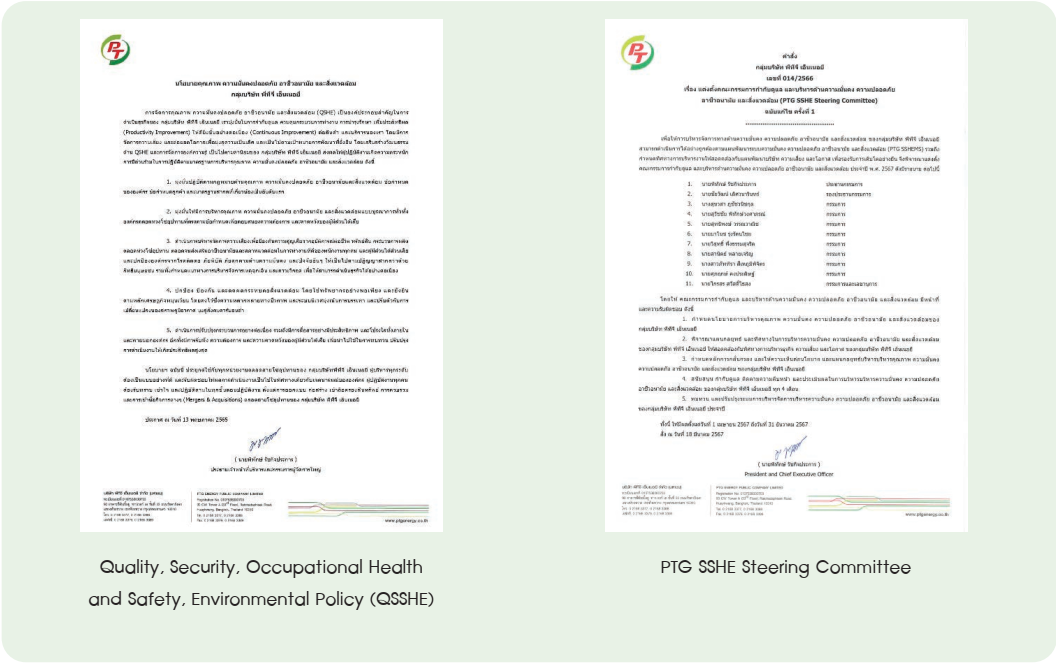
Process for Ensuring
Compliance with Environmental Laws and Regulations
PTG is committed to strict
adherence to environmental laws and regulations to prevent any negative impact
on both legal standing and the company’s reputation. Ensuring
compliance with environmental laws and regulations is an ongoing process that
requires continuous development. This includes regularly monitoring
and reviewing new or amended laws and regulations to ensure that business
operations remain aligned with changing requirements. Internal
audits and assessments are conducted to evaluate adherence to international
standards, legal requirements, and the company’s
environmental management policies. This ensures the company’s
operations are in full compliance with established standards, with transparent
documentation and reporting. In the event of issues or non-compliance,
corrective actions are taken, and preventive measures are implemented to avoid
recurrence. Additionally, the company continuously evaluates and
refines processes to ensure operations are effective and sustainably compliant
with legal requirements.
Certification of Environmental Management System
PTG has established an environmental management process to ensure that the organization adheres to best practices and management systems for quality, safety, and environmental protection. The application of international standards demonstrates the company’s commitment to safeguarding the environment, preventing harm, and reducing impacts, while also ensuring employee safety. These standards include the Environmental Management System (ISO 14001), Occupational Health and Safety Management System (ISO 45001), and Quality Management System (ISO 9001). Furthermore, in 2024, the company adopted guidelines from the Department of Climate Change and Environment to enhance resource, energy, and environmental management within its offices. This initiative also contributed to raising office standards to be more environmentally friendly. PTG has earned Green Office certification, and PTG Logistics Group has been awarded the Green Industry certification. In addition, various environmental projects have been implemented, with data verification and certification conducted by external organizations.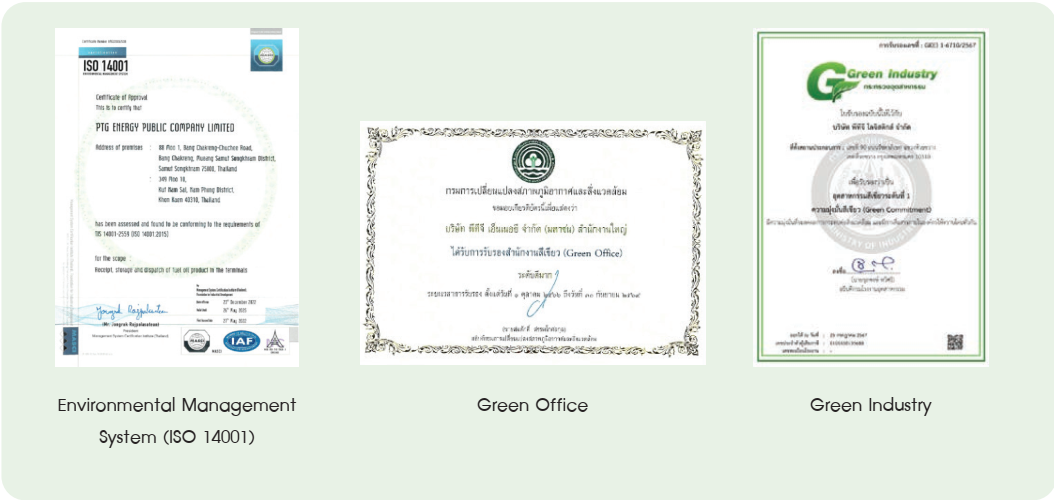
Download Quality, Security, Safety, Occupational Health and Environmental Management Policy
Sustainable Packaging Policy
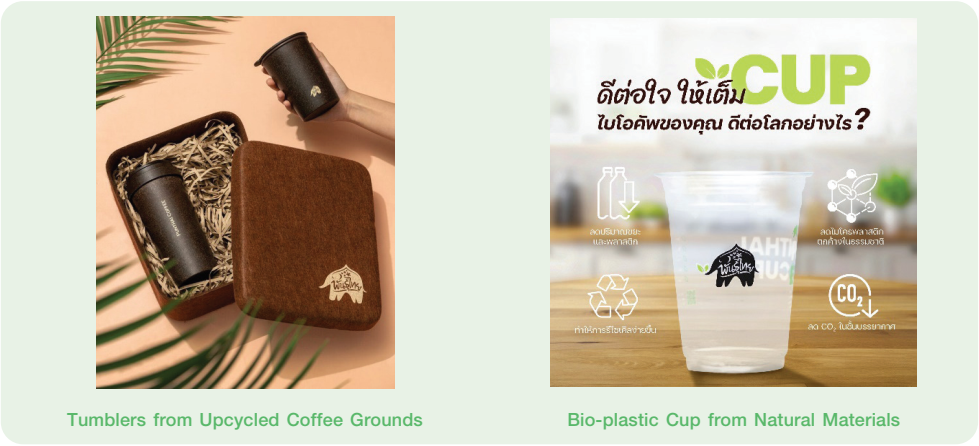
Download Sustainable Packaging Policy
Energy Management
Management Approach
PTG implements comprehensive energy management practices across both fuel and electricity usage in its business operations. The company adheres to energy management standards, continuously tracks and audits performance, and applies improvements based on findings. Annual data on energy consumption is recorded, including fuel usage for transportation and electricity consumption in office spaces. This approach allows PTG to monitor energy usage trends, identify areas for potential savings, and evaluate opportunities for efficiency improvements. The insights gained are used to develop energy-saving projects, ensuring more effective energy management.

Energy Consumption Reduction Measures
- Electricity Conservation Campaign at the Headquarters
PTG has implemented a continuous program to reduce electricity usage at its headquarters through employee awareness and active participation. The company communicates energy-saving practices through established communication channels to ensure that employees are informed and adhere to these measures. These practices include turning off lights when not in use, switching off lights during lunch breaks, powering down computer screens during breaks, setting photocopiers and computers to standby mode, adjusting air conditioning to optimal temperatures, unplugging electrical devices when not in use, setting air conditioners to automatic timers after working hours, and only lighting areas where people are present to minimize unnecessary electricity consumption. Additionally, PTG encourages the use of energy-efficient, environmentally certified electrical equipment to further promote sustainable energy practices.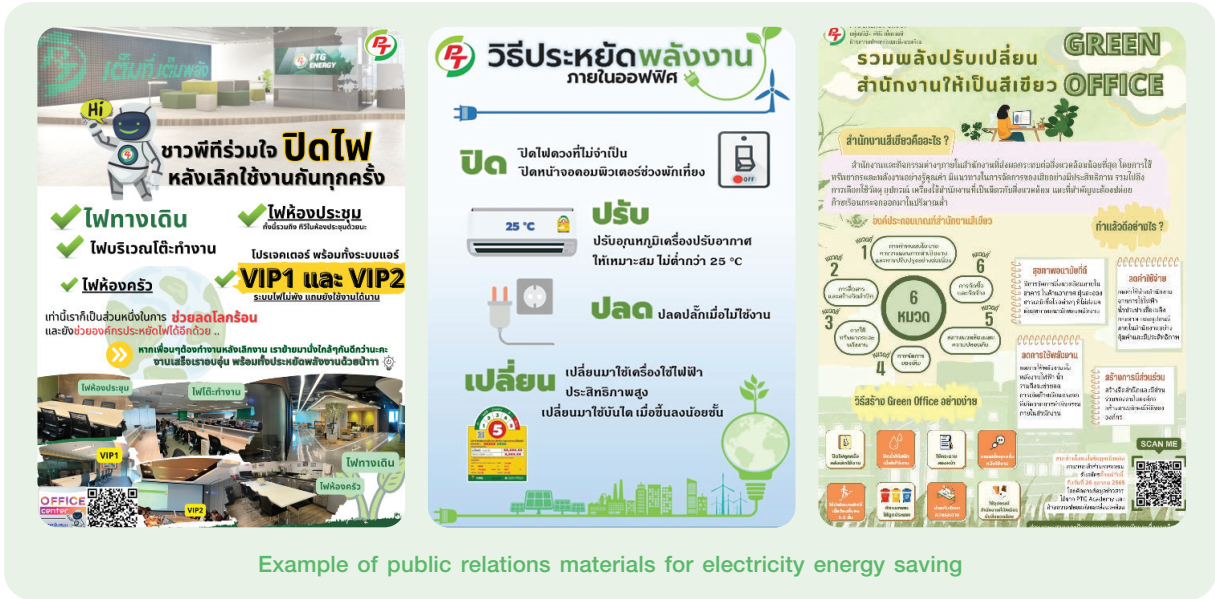
- Fuel Management Program
PTG is committed to managing fuel consumption efficiently by closely monitoring and recording fuel usage data from relevant departments. The company regularly checks for excess fuel charges and prepares detailed monthly reports on fuel consumption, which are presented to management for evaluation. - Green Meetings Program – Environmentally Friendly Meetings at the
Headquarters
PTG has incorporated the principles of sustainable meetings to establish an environmentally friendly approach for organizing internal meetings (Green Meetings). The initiative focuses on optimizing the use of organizational resources and energy, conserving natural resources, and utilizing natural materials for decor. Meeting venues are selected based on the number of attendees, and eco-friendly equipment is used in all meeting rooms. Participants are encouraged to adhere to Green Meeting practices, such as turning off lights and electronic devices when not in use, refraining from eating in the meeting room to minimize waste, and promoting efficient resource usage. These efforts align with Circular Economy principles, striving to reduce the overall environmental impact. - Sustainability Events Program
The Sustainability Events program is based on the guidelines from the Office of the Thailand Convention and Exhibition Bureau (Public Organization), or TCEB, which prioritizes the conservation of natural resources and the environment. The program actively encourages participants to contribute to reducing carbon dioxide emissions during events, fostering awareness about the importance of minimizing emissions from the very beginning. This includes optimizing energy use, responsibly managing resources, and minimizing waste within the organization. The program will continue to operate to reduce environmental impacts while supporting the United Nations' Sustainable Development Goals (SDGs). This effort is carried out through collaboration between event organizers, participants, and relevant stakeholders.
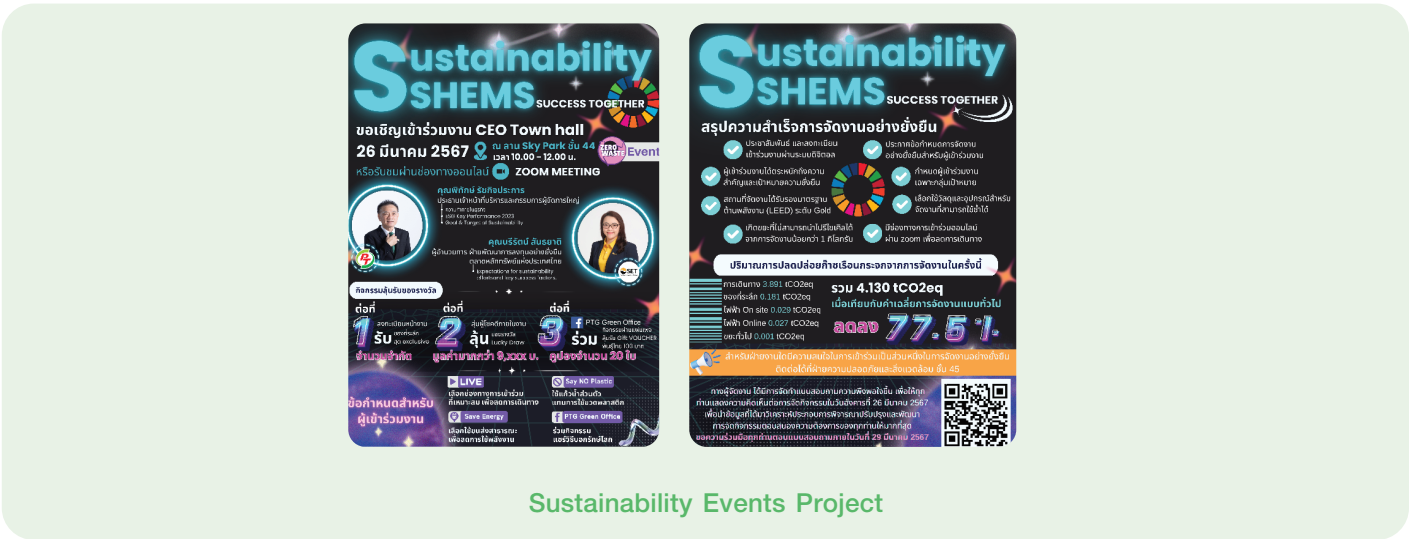
Performance
| Indicators | 2021 | 2022 | 2023 |
| Electricity consumption per liter of oil sold through oil depots (unit: kWh/liter) | -26.21% | -5.76% | -1.64% |
| Electricity consumption per liter of oil sold through COCO service stations (unit: kWh/liter) | -65.96% | -1.77% | 9.38% |
| Electricity consumption per person for
activities within the headquarters area (unit: kWh/person/month) |
58.56 | 23.55 | 22.38 (-4.97%) |
| Average fuel consumption of company vehicles has decreased (unit: liters/month) | 46,433.71 | 39,104.59 | 43,080.39 (10.17%) |
- The increase in electricity consumption per liter of oil sold through COCO service stations is attributed to higher electricity usage resulting from the expansion of service stations and increased customer activity.
- The rise in fuel consumption is due to business growth, such as the addition of new service station branches, Punthai Coffee outlets, and other business ventures.
Water Management

-
All business units are required to install wastewater treatment systems or grease traps to manage wastewater from the source. This ensures that wastewater released into the environment meets legal standards and does not negatively impact surrounding ecosystems or communities.
-
Business units with wastewater treatment systems or grease traps must clean and maintain them at least once a week to ensure their optimal performance.
- Water usage data is recorded and analyzed by business units to track trends and identify opportunities for further water conservation.
- Water usage reduction targets are shared with employees to raise awareness and encourage their active participation in conserving water resources.
- Awareness campaigns are conducted through the development of educational materials and online courses, such as the Green Office program, to foster sustainable water practices.
- A communication platform is provided for employees to report any malfunctioning equipment, allowing for immediate repairs or replacements.
Additionally, the company has launched the following water management initiative:
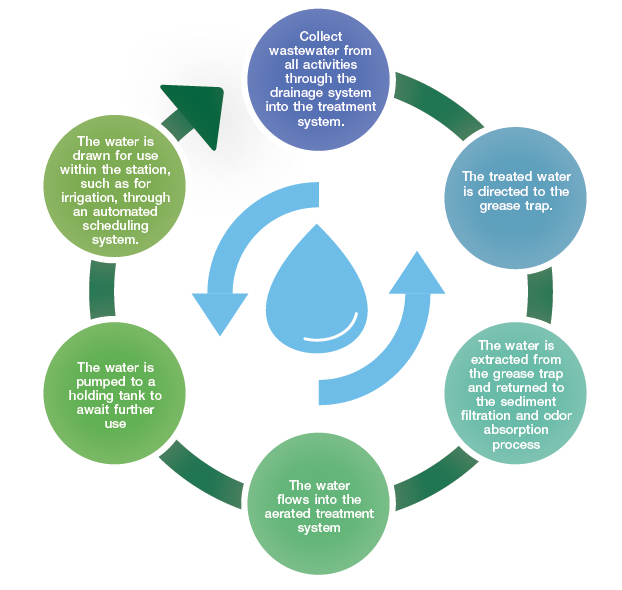
| Indicators | 2022 | 2023 | 2024 |
| Proportion of tap water consumption per oil sales through oil depots | -45.02% | 6.76% | -3.48% |
| Proportion of tap water consumption per oil sales through service stations | 16.01 | -13.80% | 7.83% |
| Water consumption per person for activities within the headquarters area (liters per person) | 81.06 | 51.89 | 47.34 (-8.77%) |
- The ratio of tap water usage per liter of oil sold through oil depots increased due to enhancements in the fire suppression system and upgrades to the firewater storage tanks.
- The ratio of tap water usage per liter of oil sold at service stations increased due to higher water consumption driven by the expansion of service stations and an increase in customer usage.
Waste Management

| Type of Waste | Examples | Waste Management Approaches |
| General waste | Food-contaminated plastic bags, Used tissue paper |
Separate and dispose of waste according to the schedule set by the municipality or local authorities in each designated area. |
| Organic waste | Leaves and twigs, Food waste | Segregate food waste for composting purposes, and send the remaining portion for disposal according to the schedule set by the municipality or local authorities in each designated area. |
| Recyclable waste | Plastic bottles, Aluminum cans | Segregate and sell recyclable waste to buyers for recycling purposes. |
| Hazardous waste | Oil-contaminated cloth, Used batteries |
Segregate and contact licensed transporters and disposers, registered with the Department of Industrial Works as operators, to handle and dispose of the waste. |
- Low Emission Support
Scheme (LESS)
PTG Head Office places a strong emphasis on reducing greenhouse gas emissions across all employee activities and strives to foster awareness and active participation through comprehensive waste management practices. This includes waste segregation and proper disposal via an in-office waste separation program. To date, the office has successfully recycled 2,910.5 kg of paper, 369 kg of plastic, and 21.8 kg of plastic bottle caps (equivalent to 10,682 caps). The organization is also in the process of seeking certification for this initiative through the Thailand Greenhouse Gas Management Organization (Public Organization) to ensure that the project effectively contributes to reducing greenhouse gas emissions.
Additionally, there are several other projects that have been certified by the Thailand Greenhouse Gas Management Organization (Public Organization), including:
- Recycling waste segregation activities at construction sites (4.353 tCO2eq)
- Waste reduction and segregation initiatives at PT oil stations in the Pathumwan and Nong Kham areas (3.677 tCO2eq)
- The Separate and Recycle project (724 kgCO2eq)
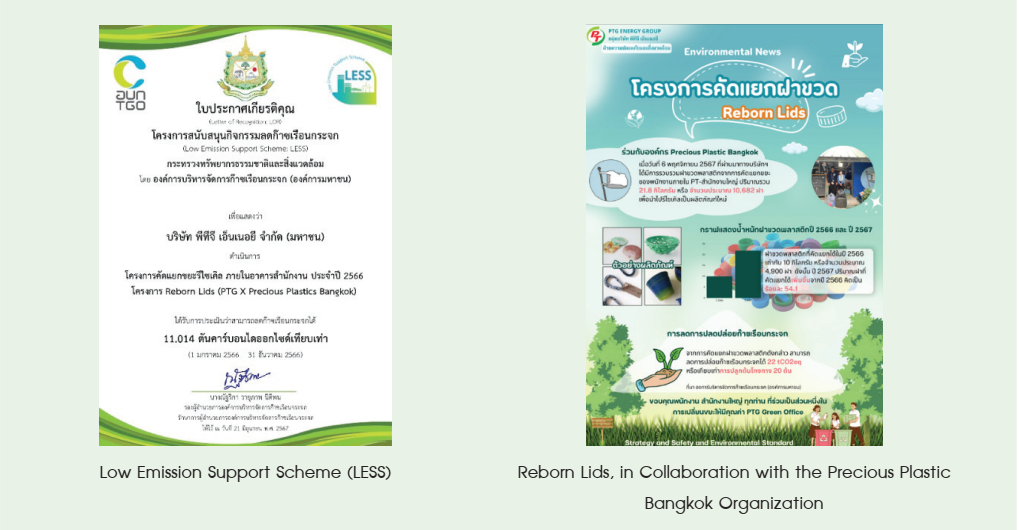
- Green
Coffee Shop Project
PTG has enhanced its Punthai Coffee and Coffee World brands, transforming them into environmentally-friendly coffee shops (Green Coffee Shops). These establishments have received certification from the Department of Climate Change, Ministry of Natural Resources and Environment. This initiative reflects PTG Energy Group’s dedication to sustainable environmental management, integrating it across all business operations.

- PT
More Waste, More Gains Project
PTG has launched an innovative waste management initiative at the Nong Kham service station, in collaboration with the Bangkok Metropolitan Administration, the Pathumwan and Nong Kham District Offices, and the Chulalongkorn University Environmental Research Institute. This ongoing project, which began in 2023, is designed to serve as a sustainable waste management model at the source.
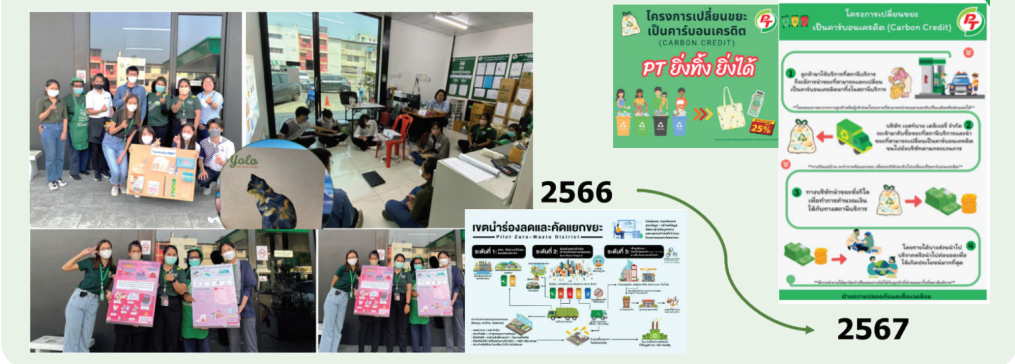
- Retreaded Tire Project
This initiative focuses on enhancing the efficiency of tire use for the company’s fleet of ten-wheel trucks, tractor units, and semi-trailers (with the exception of the front and drive tires, which still use new tires for safety reasons). By switching to retreaded tires for certain wheels, this project extends tire life, reduces waste from expired tires, and minimizes the need for new tire purchases, resulting in significant cost savings for the company. Since its launch in 2017, the program has been consistently applied, and by 2024, a total of 1,045 retreaded tires have been implemented, generating savings of up to 7,956,000 baht. This initiative underscores the company’s commitment to resource optimization and supports sustainable environmental practices through recycling. - Perk from Tash Project
The Perk from Tash project promotes sustainable waste management by offering companies located in CW Tower the opportunity to collect recyclable materials, including paper, plastic, and metal, and send them for processing through the building's management. In return, companies earn points that can be redeemed for various benefits, such as discounts on off-hours air conditioning services. This initiative not only helps reduce waste but also fosters greater awareness of waste segregation and recycling within the organization. It provides tangible incentives for environmental stewardship while offering companies the opportunity to lower operational costs in the long term. - Waste Segregation Point Project
This project focuses on implementing a systematic waste management approach within oil storage areas, with designated spaces for sorting waste into categories such as general waste, recyclables, organic waste, and hazardous waste. The goal is to handle waste efficiently and in an environmentally responsible manner. As a result, the initiative has successfully reduced the amount of waste sent for direct disposal while increasing opportunities for material reuse and recycling. Furthermore, separating hazardous waste from other waste types helps mitigate risks to both the environment and employee health. The program also includes training sessions and educational initiatives on waste segregation, alongside clear signage at disposal points to promote understanding and encourage cooperation from all parties in the oil depot. - Public Awareness Campaign
to Reduce and Eliminate Foam Box Usage in the Depot
The company has launched a public awareness campaign to reduce and eliminate the use of foam boxes within the oil depot. This initiative focuses on educating employees and workers about the environmental impact of foam products and encourages the adoption of eco-friendly alternatives, such as recyclable or biodegradable packaging materials. By supporting sustainability goals, this campaign helps to minimize waste and its detrimental effects on the surrounding community. - Hazardous Waste Management Measures: Oil Spill
The company implements strict and continuous measures to prevent and address the impact of oil spills as follows:
- Preventive Measures
- Install steel trays and boom systems to prevent oil from leaking into water sources during every oil transfer.
- Supervise oil transfer operations by assigned personnel, with strict inspection throughout the process.
- Conduct pressure testing of transfer pipes every 6 months (rubber hoses) and every 1 year (steel pipes); any damage found is repaired - immediately.
- Halt all transfer operations immediately in case of strong waves or hazardous conditions to prevent emergencies. - Emergency Response Measures
- Prepare oil absorbent equipment and containment booms at operation points and ports to control the spread of oil spills.
- Conduct emergency drills for oil spill incidents at least twice a year to ensure staff familiarity and preparedness. - Post-Incident Waste Management
- Contaminated oil and sludge will be processed through the Dissolved Air Flotation (DAF) system and stored in 18,000-liter tanks for proper disposal by authorized agencies.
- Clean oil traps and drainage systems regularly (weekly/monthly).
Performance
| Indicators | 2022 | 2023 | 2024 |
| Proportion of hazardous waste and waste disposed of properly, in compliance with legal regulations, without any adverse environmental impact. | 100% | 100% | 100% |
| Significant oil and chemical spills (case) | 0 | 1 | 0 |
| Average paper consumption within the headquarters (sheets/person/month) | 204,521 | 201,902 | 214,922 (6.45%) |
| Average general waste generated from activities within the headquarters (kg/person/month) | 3.95 | 2.18 | 1.77
(-18.81%) |
- The volume of oil spills that significantly impact land or water sources exceeds 100 barrels per incident.
- The data scope for 2022 includes the headquarters, oil depots, and transportation maintenance centers. For 2023 and 2024, the scope has been expanded to include distribution centers.
- The increase in volume is attributed to the documentation supporting operations and the rise in activities.
Environmentally friendly procurement
Purchasing environmentally friendly products
In choosing environmentally friendly products, shoppers must consider environmentally friendly product certifications such as green label certified products, energy saving label No. 5, high efficiency label, carbon footprint label, etc. to ensure that the selected products and services will not cause pollution that affects the environment. If those purchasing products are unable to choose certified environmentally friendly products, they can consider selecting products and services from the following criteria by comparing the products or services that will be re-selected with the products or services that have been used previously using the following criteria:
1.1.1 Materials with low environmental impact, such as non-toxic materials, renewable materials, recyclable materials, and low-energy materials, are used in the procurement.
1.1.2 Use fewer materials, such as light weight, small size, and fewer material types.
1.1.3 Have the most efficient production technology, such as using clean energy to reduce waste from the production process and reduce the steps of the production process.
1.1.4 Have the most efficient transportation and distribution system possible; for example, reduce the use of extravagant packaging, use packaging made from reusable or renewable materials, and choose the most energy-efficient transport routes.
1.1.5 Reduce the impact on the environment during use, such as through low energy consumption. It has low emissions during operation, reducing the consumption of consumables and the use of unnecessary parts.
1.1.6 It is worthwhile for a lifetime of use because it is durable, easy to repair and maintain, and can be improved without frequent replacement.
1.1.7 There is a highly effective end-of-life management system, such as a design that allows products or parts to be easily reused or recirculated, or energy can be recovered if disposed of.
Environmentally friendly outsourcing
In the event that the company has hired an outside person or department to operate within the company, the appropriate person or department should be selected; that is, it must have a specific quality operating standard in environmental management that has the following features:
1. Accredited with national or international environmental management standards, such as the Green Industry certification or the Environmental Management System standard (ISO 14001:2015), etc.
2. Availability of various pollution prevention measures that occur during work, such as air pollution and noise pollution.
3. Availability of protection against hazards arising from construction or operations
4. Use environmentally friendly products.
5. Employees of the department receive training in the use of resources and energy efficient environmental management.
Pollution Management

- Installation of Vapor Recovery Units (VRUs) in Fuel Tank Trucks
The company recognizes the environmental impacts associated with fuel transportation and has therefore installed Vapor Recovery Units (VRUs) in fuel tank trucks to prevent the evaporation of volatile organic compounds (VOCs), which may affect air quality. A systematic preventive maintenance (PM) plan has been implemented to ensure that the VRU systems and related equipment operate efficiently and continuously. In addition, the company plans to deploy 10 fuel transport trucks equipped with EURO 5 standard technology which features low emission levels by the year 2025. This initiative aims to reduce particulate matter and greenhouse gas emissions. These efforts align with the company’s air quality management goals and support the environmental aspects of the Sustainable Development Goals (SDGs).
| Description | Standard Values | Results on Average | |
| 2023 | 2024 | ||
| 1. Fine dust of all sizes that can enter and accumulate in the lung air sacs. | 3 mg/m3 | <1 mg/m3 | 0.05 mg/m3 |
| 2. Volatile organic compounds (VOCs), such benzene | 100 ppm | <0.05 ppm | 0.15 ppm |
| 3. Methyl Tertiary Butyl Ether (MTBE) | 1.7 µg/m3 | - | - |
Sustainable Environmental Supply Chain Management
In the past year, a total of 290 contractors were assessed through the SAQ. In addition, the company organized training sessions for construction contractors working within its premises to enhance their understanding of safe, proper, and environmentally responsible work practices.
The company also conducts ESG audits in alignment with its Supplier Code of Conduct for Critical Tier 1 suppliers identified as high-risk. Suppliers who do not meet the assessment criteria are required to submit a Corrective Action Plan, which is followed up at least once a year to ensure continuous improvement and alignment with the company’s sustainability principles.






